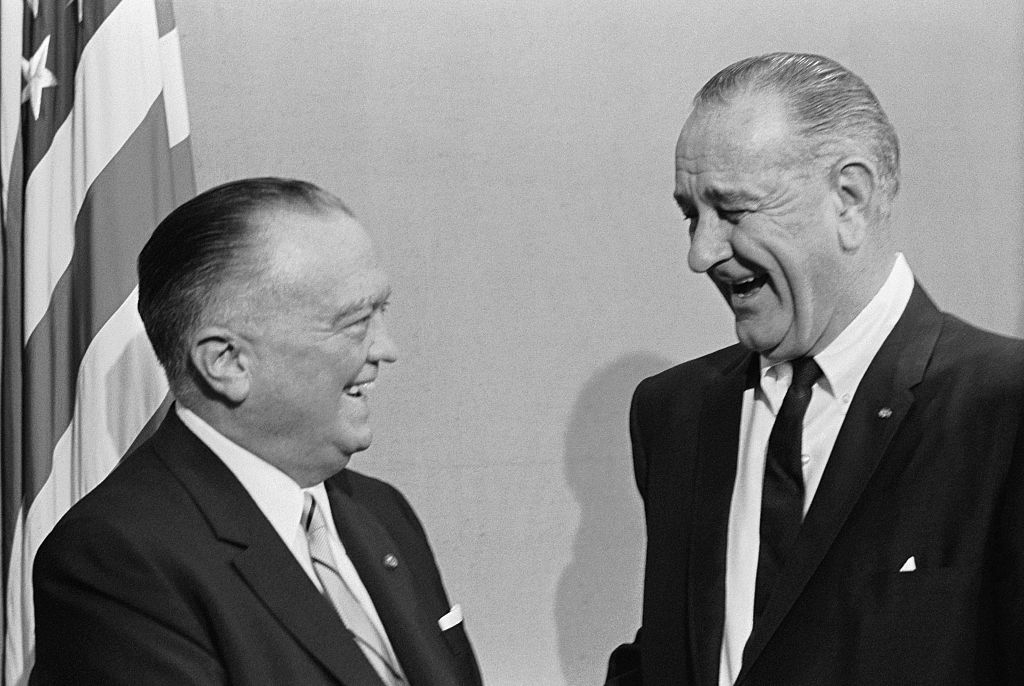
Sixty years after the FBI marked Martin Luther King Jr. as America’s “most dangerous Negro,” the FBI incorporates the preacher in its new agent training, pledging to honor King by upholding the civil rights of all citizens. While this appears to signal a critical shift in the institution’s culture, nothing could be further from the truth. The same practices—treating communities of color as suspicious and potentially un-American, surveilling anti-racist movements while standing aside during escalating white supremacist violence—have continued.
While the FBI had been surveilling King and the civil rights movement for years, the official sign-off for electronic surveillance on King began on Oct. 10, 1963. Attorney General Robert Kennedy granted FBI Director J. Edgar Hoover and his bureau such legal permission on the premise that King was a communist threat. But, the FBI knew that wasn’t true because it had just conducted a thorough investigation of communist influence in the civil rights movement, finding none.
Rather, it was the March on Washington that alarmed the Kennedy Administration—they had installed a kill switch in the microphone and 150 FBI agents were on hand that day. And the reach and power of King’s address worried the Bureau and the Kennedy administration. King had stressed how the U.S. had given Black people a “bad check,” decried the “unspeakable horrors of police brutality,” and made clear that “America has defaulted on this promissory note insofar as her citizens of color are concerned.” The FBI concluded that King was “demagogic” and leading America into a “racial revolution.” They marked him “the most dangerous Negro of the future in this nation…from the standpoint…of national security.”
Read More: FBI Letter to Martin Luther King Jr. Reveals Ugly Truths From Hoover's Era
The FBI decided King needed to be stopped, and did not allow the lack of evidence concerning a communist conspiracy to get in the way. “Facts by themselves are not too meaningful,” the FBI’s Domestic Intelligence Division noted. “They are somewhat like stones tossed in a heap as contrasted to the same stones put in the form of a sound edifice.”
And so, the FBI constructed its own heap of stones installing wiretaps and microphones on King’s home and wherever the non-violent preacher went, including hotel rooms, the Atlanta and New York offices of the Southern Christian Leadership Conference (SCLC), and the homes of friends with whom he occasionally resided. The FBI then distributed its “counter-intelligence” to the Kennedy and Johnson administrations. Nearly weekly for the four and half years between the beginning surveillance and King's assassination in 1968, Hoover directly apprised President Lyndon B. Johnson of the information gleaned. In more than 250 memos, Hoover sent the president political intel, accounts of King and his advisors criticizing Johnson, and even personal information.
The FBI had plenty of partners outside of the White House as well. Congressmen, leading journalists, and ministers were illegally supplied with data obtained from the Bureau’s technical surveillance on King. It contained private information, not evidence of criminal activity. Congressmen and ministers used the counter-intelligence in their speeches, sermons, and publications to discredit King, smearing him as un-American and an "extremist." Journalists refused to publish the salacious material, but never exposed the Bureau’s extraordinary monitoring of the civil rights leader.
In contrast to the way the FBI surveilled and targeted the Black freedom movement despite no evidence of any wrongdoing, the Bureau regularly cast white racist violence as outside of its jurisdiction—even when agents had prior knowledge from KKK informants. In 1961, through its Klan informants, the Bureau had advance warning that Freedom Riders were going to be attacked when their bus reached Birmingham; they did nothing and many of the Freedom Riders had to be hospitalized because of the brutal attack they endured. In 1963, the FBI withheld evidence gathered by informants and surveillance identifying the perpetrators of the bombing of Birmingham’s 16th Street Baptist Church. In 1965, Gary Thomas Rowe, a paid informant was in the car whose occupants killed white Detroiter Viola Liuzzo following King’s Selma to Montgomery March but the FBI scuttled the investigation, trying to smear Liuzzo instead to protect Rowe.
In April 1964, King publicly called attention to the FBI’s unwillingness to investigate white supremacist violence, telling a news reporter, “You can’t explain to a Negro how it is that a plane can be bombed, and its pieces scattered for miles and the crime can be solved,” King noted, “but [the FBI] can’t find out who bombed a church.” Hoover was furious, calling King a “notorious liar.” And the FBI’s campaign against King expanded even further.
In recent years, the FBI has claimed to acknowledge this “shameful history.” Former FBI director James Comey displayed the 1963 memo on his desk as a reminder of FBI overreach and had new agents visit the King Memorial on the National Mall, study King’s quotes, and write essays “about the intersections” of King’s philosophy and the values of the FBI. And an MLK quote—“The time is always right to do what is right”—is etched in stone at the FBI’s main training facility in Quantico, VA.
And yet, this kind of commemoration of King conveniently misses the point. The modern FBI has 15,000 paid informants, and in the 21st century an immense number have been focused within the Muslim community, surveilling mosques, Muslim student groups, chat rooms, and charity fundraisers. This is a dramatic increase from 1974 when investigations by the Senate Church Committee into COINTELPRO revealed the FBI had 1,500 paid informants.
At the same time, the FBI still has yet to make a serious commitment to stopping violent white supremacy, even though white supremacist violence has been deemed the nation’s top national security threat. The FBI had an “unusual number of informants” in the Proud Boys. They had been warned of the potential for violence on January 6th, 2021, but didn’t move to stop it.
Read More: Working for J. Edgar Hoover, I Saw His Worst Excesses and Best Intentions
The answer to the white-supremacist threat is not to give the FBI more power, something that the Federal Domestic Terrorism Prevention Act of 2023, a bill with Democratic backing, would do.
An already powerful FBI and DOJ do not need more authority and resources to investigate and prevent white supremacist violence. They just need to make it a priority. During the Cold War, the “red scare” of communism enabled the FBI to gain power, which resulted in violations of the civil rights of King and many, many others in the civil rights movement. And after 9/11, faced with a new national security threat, the FBI convinced the country to give it more power, and used it to maintain almost constant surveillance of American Muslims.

Such authority has been and continues to be used to perpetuate the Bureau’s longstanding practice of surveilling communities of color and undermining anti-racist movements. As Black Lives Matter gained national attention following Ferguson, the FBI Counterterrorism Division created the label “Black Identity Extremists,” claiming that BLM groups posed a potential terrorist threat because of their potential responses to “perceived racism and injustice.” Recently, the FBI, along with local law enforcement, has turned its attention to Atlanta’s Stop Cop City movement, going as far as surveilling events by supporters in Chicago.
Sound familiar? It should; these are the same kinds of assumptions, practices, and alternative facts that undergirded the FBI’s campaign against King and the civil rights movement. To learn from Oct. 10, 1963, then, is not to give the FBI more power under the guise of new threats but to reckon with our national tendency, then and now, to fear and criminalize those who call this country to account for its racism and troubling law enforcement practices.
Lerone A. Martin is the Martin Luther King, Jr., centennial professor and director of the Martin Luther King, Jr. Research and Education Institute at Stanford University and the author of The Gospel of J. Edgar Hoover: How the FBI Aided and Abetted White Christian Nationalism. Jeanne Theoharis is distinguished professor of political science at Brooklyn College and the author of A More Beautiful and Terrible History: The Uses and Misuses of Civil Rights History. Made by History takes readers beyond the headlines with articles written and edited by professional historians. Learn more about Made by History at TIME here.
More Must-Reads from TIME
- Cybersecurity Experts Are Sounding the Alarm on DOGE
- Meet the 2025 Women of the Year
- The Harsh Truth About Disability Inclusion
- Why Do More Young Adults Have Cancer?
- Colman Domingo Leads With Radical Love
- How to Get Better at Doing Things Alone
- Michelle Zauner Stares Down the Darkness
Write to Lerone A. Martin and Jeanne Theoharis / Made by History at madebyhistory@time.com
